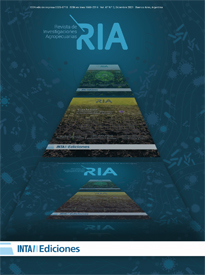Ver ítem
- xmlui.general.dspace_homeCentros e Institutos de InvestigaciónCIAP. Centro de Investigaciones AgropecuariasInstituto de Patología VegetalArtículos científicosxmlui.ArtifactBrowser.ItemViewer.trail
- Inicio
- Centros e Institutos de Investigación
- CIAP. Centro de Investigaciones Agropecuarias
- Instituto de Patología Vegetal
- Artículos científicos
- Ver ítem
Caracterización de Xylella fastidiosa a partir de materiales vegetales y cepas aisladas de olivo (Olea europaea L.) e implementación de un sistema de diagnóstico serológico en Argentina
Resumen
Xylella fastidiosa está considerada plaga cuarentenaria de importancia global por el grave impacto económico y social que ocasiona en cultivos de importancia agrícola. El objetivo de este trabajo fue aislar y caracterizar cepas bacterianas y muestras vegetales infectadas con X. fastidiosa de plantas de olivo (Olea europaea L.) e implementar un sistema de diagnóstico serológico para su detección. Para la caracterización molecular se utilizó el sistema de
[ver mas...]
Xylella fastidiosa está considerada plaga cuarentenaria de importancia global por el grave impacto económico y social que ocasiona en cultivos de importancia agrícola. El objetivo de este trabajo fue aislar y caracterizar cepas bacterianas y muestras vegetales infectadas con X. fastidiosa de plantas de olivo (Olea europaea L.) e implementar un sistema de diagnóstico serológico para su detección. Para la caracterización molecular se utilizó el sistema de tipificación multilocus de secuencias (MLST). Se logró el aislamiento de la bacteria desde olivo y se determinó que todos los materiales caracterizados corresponden a X. fastidiosa subespecie pauca ST69, un grupo genético solo presente en Argentina. Se elaboraron reactivos serológicos fundamentales para la puesta a punto de técnicas de diagnóstico. Con la técnica DAS ELISA se logró un sistema de diagnóstico rápido, robusto y económico, permitiendo resolver la ausencia de disponibilidad continua de reactivos serológicos específicos para X. fastidiosa.
[Cerrar]
Xylella fastidiosa is considered a quarantine pest of global significance due to the severe economic and social damage it causes on most valuable crops. The objective of this work was to isolate and characterize bacterial strains of infected with X. fastidiosa of olive (Olea europaea L.) samples and implement a serological diagnostic system for their detection. For the molecular characterization, the multilocus sequence typing system (MLST) was used. The
[ver mas...]
Xylella fastidiosa is considered a quarantine pest of global significance due to the severe economic and social damage it causes on most valuable crops. The objective of this work was to isolate and characterize bacterial strains of infected with X. fastidiosa of olive (Olea europaea L.) samples and implement a serological diagnostic system for their detection. For the molecular characterization, the multilocus sequence typing system (MLST) was used. The isolation of the bacterium from the olive tree was achieved and it was determined that all materials characterized correspond to X. fastidiosa subsp. pauca ST69, a genetic subgroup that has been detected only in Argentina. An antiserum was produced and serological diagnosis systems were adjusted. A solid, fast and economical diagnostic method DAS ELISA system was achieved, solving the continuous lack of availability of serological reagents for X. fastidiosa.
[Cerrar]

Fuente
RIA 47 (3) : 380-389 (diciembre 2021)
Fecha
2021-12
Editorial
Ediciones INTA
ISSN
0325-8718
0325-8718
0325-8718
Formato
pdf
Tipo de documento
artículo
Palabras Claves
Derechos de acceso
Abierto
 Excepto donde se diga explicitamente, este item se publica bajo la siguiente descripción: Creative Commons Attribution-NonCommercial-ShareAlike 2.5 Unported (CC BY-NC-SA 2.5)
Excepto donde se diga explicitamente, este item se publica bajo la siguiente descripción: Creative Commons Attribution-NonCommercial-ShareAlike 2.5 Unported (CC BY-NC-SA 2.5)


